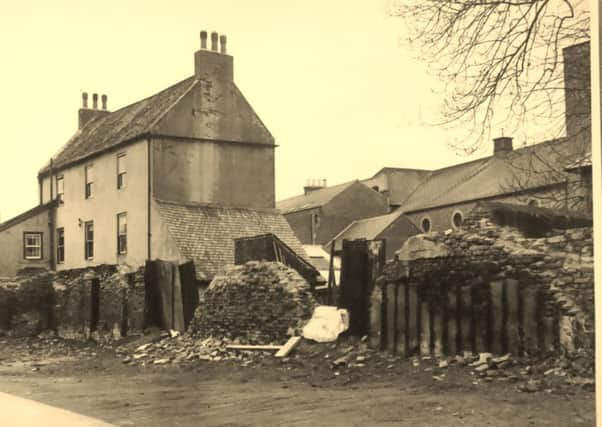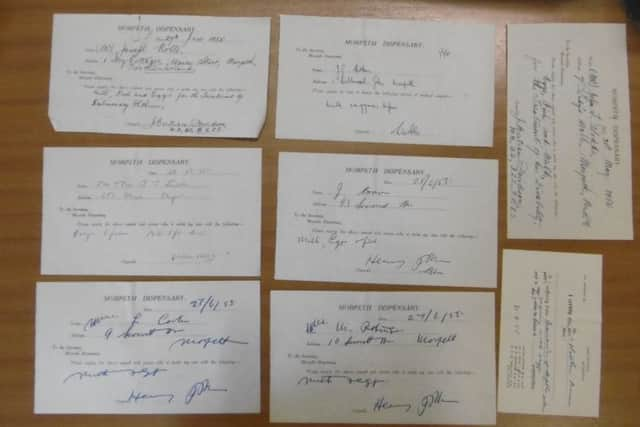NHS heralds a new role for Dispensary


The late Jim Mackay told me that, at first, the trustees thought they would simply close the charity down. Instead, however, they consulted the local doctors to see what the Dispensary could do in the changed circumstances.
The AGM for that year was delayed until June 1949. At it, the Secretary reported that the scheme they devised had the support of the doctors, but still needed to be approved by the Charity Commission. This had been a formidable undertaking, but it had been approved without alteration.


Advertisement
Hide AdAdvertisement
Hide AdDr H. Dickie had explained the new Health Act to them, and Mr S. Rutherford, of Brumell & Sample, the situation regarding the Charity Commission. Canon Baker was thanked for his able presentation of the new scheme.
When it was time to elect governors and officers, Canon Baker asked if ladies were eligible. This was agreed, and Coun Dorothy Moore was elected.
Early in September 1949, the Dispensary opened its doors once again. Two kinds of relief were on offer: the supply of supplementary foods, if not available on the National Health, and the loan of sick room furniture and equipment, wheelchairs, etc.
In 1996, the late Margaret Lothian told me: “I remember the Dispensary, and who lived in it. It was Miss — I can't remember the name — of the Dispensary.


Advertisement
Hide AdAdvertisement
Hide Ad"My grandmother knew their parents. They had a surgery and a little dispensary there, but they were finished being used by the time I saw it.
“People have left money to the Dispensary until quite recently. Victor's (Mr Lothian's) father was on the Committee. After the National Health started, in 1948, you were not supposed to need a Dispensary doctor. I worked for Dr Hugh Dickie, in Greystoke.
“The Dispensary did milk and eggs. You got a Dispensary ticket.... It went to the Committee, and you got a book to last three months, for so much milk and so many eggs a week.
“Jim Mackay, or possibly his father, would approve it, but earlier, it was the doctor who approved it. I would ask Dr Woodman if he would sign for a three-month book. It was like signing a cheque. Possibly it was just for certain shops that the Dispensary had an account with.
Advertisement
Hide AdAdvertisement
Hide Ad“A number of people wouldn't ask for a Dispensary ticket, they were too independent, but some would try to pull a fast one over you.”
The introduction of the NHS had yet other effects. Subscriptions fell, and the only donation was £11 from the Morpeth Carol Society.
In the accounts for 1951, the main source of income was £135 2s 10d from investments. Donations had recovered to £15 15s 4d, and rent accounted for £58 10s. But subscription income was a mere 11/6.
By 1954, the food programme was in full swing. The eggs, fish and fruit cost £131 13s 4d, milk £110 13s 8d, and Sanatogen, Horlicks, etc., £29 19s 6d. All other expenses were just under £82.
Advertisement
Hide AdAdvertisement
Hide AdA schedule for the quarter ended December 1954 lists 13 names. Everybody got a pint of milk per day, and most, either six or a dozen eggs per week. Seven got fish (or rabbit) twice a week. Eight got money from the National Assistance Board. This was recorded so that the Committee could take it into account in assessing their need. Curiously, fruit is not mentioned.
After a few years, however, the scheme went into a decline. In 1959, the eggs, milk, fish, fruit and special foods only came to £109.
The equipment on loan included several infra-red lamps. In January 1964, all the lamps were called in to be checked by an electrician.
The Secretary reported that: “The number of beneficiaries was again ten. Borrowings of equipment continued to be at a low rate.”
Advertisement
Hide AdAdvertisement
Hide AdWith increasing prosperity, there was no longer a demand for extra nourishing food. In effect, instead of spending their time looking after the sick poor of the town, the trustees were managing a building. They had considered selling it in 1956, but now, in 1964, they decided to act.
In January, the Rev Norman Hall raised the matter of its effect on Miss Nicholson, the housekeeper. She had lived all her life in the Dispensary and uncertainty was affecting her health. Following the July meeting, the Secretary wrote to the Town Clerk to see if the council could rehouse Mr and Miss Nicholson.
That meeting was the last to be held at the Dispensary. After that, the Committee met at the Savings Bank.
In September, an offer was received from Drs Stenhouse, McKellar and Rowe of £3,600. However, the Charity Commission, in whose name the property was held, said that this was not enough and would have to be advanced.
Advertisement
Hide AdAdvertisement
Hide AdMr A.C. Mason, who occupied the first floor with his family, was buying his own house. He asked if they might occupy the ground floor as well, agreed to vacate on four weeks’ notice, and wanted to buy some of the furniture.
The sick room equipment was all disposed of to the Red Cross, and the doctors and existing borrowers so informed.
In October, a clock and a cheque for £150 were presented to Miss Nicholson on her retirement. The portrait of Mr Jobling was given to the Morpeth Savings Bank.
In January 1965, offers were received of £3,750 from the Borough Council, and £3,800 from Mr J. Resteghini. The Charity Commission recommended inviting both bidders to raise their offer.
A letter of thanks was received from Miss Nicholson.
Advertisement
Hide AdAdvertisement
Hide AdThe Borough Council withdrew, and Mr Resteghini's offer was accepted, subject to Charity Commission approval.
On January 25, the Secretary met the County Archivist at the Dispensary to discuss the disposal of the old records. That evening, the Committee agreed unanimously: "that all records not currently in use, together with any equipment of antiquarian value, be handed over to the Record Office.”
The Early Christian Landscape of the Wansbeck Valley, 48 pages, illustrated, is now on sale at Newgate News and Morpeth TIC.